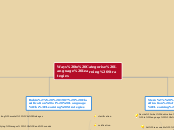Ways to Categorise Language Learning Strategies
Oxford's (2003) Six Main Categories of L2
Learning Strategies
exploring cultural and social norms
talking with a native-speaking
conversation partner
asking for help in doing a language
task
asking for clarification of a confusing
point
asking questions to get verification
develop self-talk
rewarding oneself for good performance
talking about feelings
idenitfy one's mood and anxiety level
Compensatory strategies
(help make up for
missing knowledge especially
productive language skills)
using synonyms and talking around
missing word
guessing from context
Memory-related strategies
(help link L2 items
or concepts)
create learning and retrieval
boday movement
a combination of
sounds and images
images
sounds
Metacognitve strategies
(managing the
learning process)
evaluating task
success
monitoring mistakes
gathering and
organising
materials
planning for L2 tasks
identify own learning styles,
preferences, and needs
Cognitive strategies
(enable learners to
manipulate
language materials)
reorganising information
outlining
synthesising
summarising
note-taking
analysing
reasoning
Stern's (1992) Classification of Language
Learning Strategies
Affective strategies
build positive feelings
towards language and
learning activities
Interpersonal strategies
evaluate learning
performance
monitor learning
development
Communicative-
experiental strategies
asking for
repetition and
explanations
to keep
conversations
going
paraphrasing
gesturing
Cognitive strategies
(help improve learning)
Monitoring
Memorisation
Practice
Deductive reasoning
Guessing/
inductive referencing
Clarification/
verification
Management and planning
strategies
(control own
learning)
Monitor progess
Select proper resources
Decide on suitable
methodology
Set reasonable
objectives
Decide what dedication
to make to language
learning
Rubin's (1987) Classification of Language
Learning Strategies
Indirect learning
strategies
Social strategies
Communication strategies
(Focus on communication
process)
make use of linguistic
or communicative
knowledge
clarifying what the
speaker intends to
say
getting meaning
across
conversation
Direct learning
strategies
Metacognitive learning
strategies (superivse self-
directed language learning)
self-
management
setting
goals
prioritising
planning
Cognitive learning
strategies (steps taken
in learning or problem
solving)
monitoring
memorisation
practice
deductive
reasonign
inductive
inference
guessing
verification
clarification
Oxford's (1990) Language
Learning Strategies System
Indirect strategies
(support language
learning)
social strategies
(learning with others)
empathising with others
cooperative with others
asking questions
affective strategies
(regulating emotions)
regulating emotions
self-encouragement
lowering anxiety
metacognitive
strategies (coordinate
learning process)
evaluating own
learning
arranging and
planning own
learning
centring own
learning
Direct strategies
(involve use of
language)
Compensatory strategies
(using the language
despite lack of
knowledge}
overcoming
difficulties in
productive skills
guessing
intelligently
cognitive strategies
(understanding and
producing
the language)
creating structure
for input and
output
analysing and
reasoning
receiving and
sending messages
practising
memory strategies (remembering and retrieving new information)
employing action
reviewing well
applying images
and sounds
creating mental
linkages

